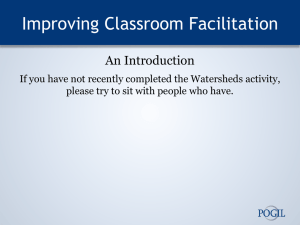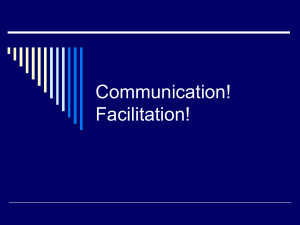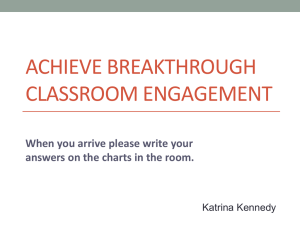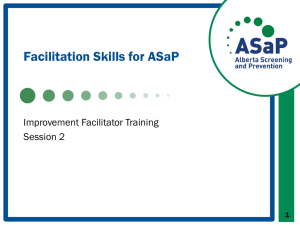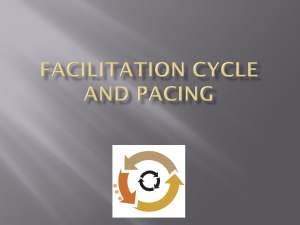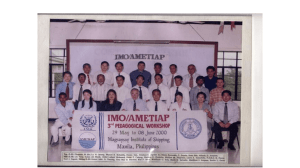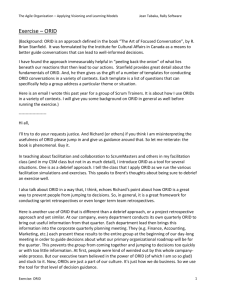Creating Effective Facilitation Plans for Capacity Building CHA/CHIP
advertisement
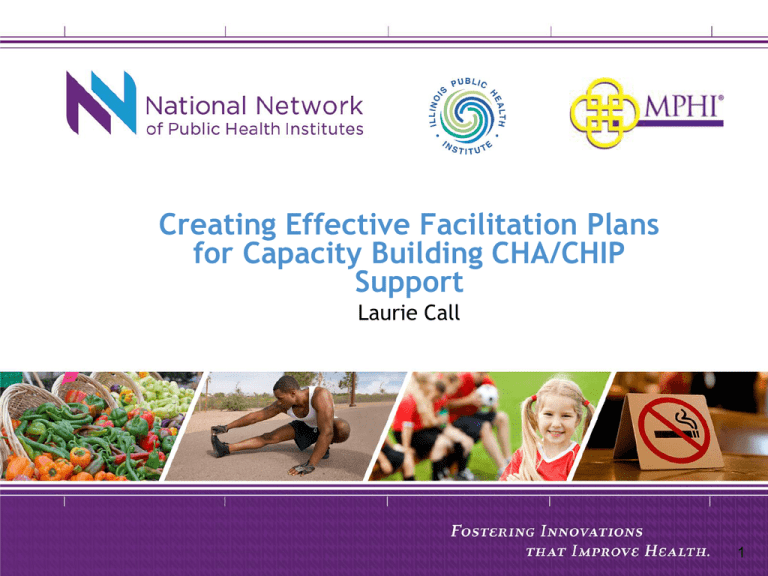
Creating Effective Facilitation Plans for Capacity Building CHA/CHIP Support Laurie Call 1 Learning Objectives Participants will be able to… Apply a tool for development of effective facilitation plans Describe methods for building partner capacity for effective facilitation Match facilitation tools and techniques with client needs 2 Rationale and Challenge Rationale • 81% of survey respondents reported serving in a facilitator role with CHA/CHIP work • Skill and techniques applicable in many areas of our work and essential to good CHA/CHIP. • The best facilitation comes from strong facilitation plans. • Increasing our facilitation toolbox through observing, hearing about, learning about different techniques keeps us fresh and expands our capacity. 3 Typical Facilitation Roles in CHA/ CHIP Work 4 Understanding client needs to develop facilitation plans 1. What are the objectives of this meeting? 2. What does the group want the end product to be? 3. At what stage is the group in group development? 4. How much time do we have? 5. Others? 5 And… 1. What’s the history of the group and their work? 2. Why does the group feel a need for a facilitator? 3. How does this meeting fit in the context of overall goals? 4. What can you tell me about leadership, members, group dynamics etc.? 5. What do you hope that happen as a result of this meeting? 6. Verify any assumptions you may have. 6 6 Stages of Group Development Adjourning Performing Forming Storming Norming Bruce Tuckman, 1965 7 7 Stages of Group Development 8 The 5 P’s of Preparation Purpose • Why are we holding the session? • What are the key objectives? Product • What do we want to have produced once we are done? • How will we know we are successful? Participants • Who needs to be involved? • What are their perspectives? Probable Issues • What are the concerns that will likely arise? • What are the “gotchas” that could prevent us from creating the product and achieving the purpose? Process • What steps should we take during the meeting to achieve the purpose, given the desired product, the participants, and the probable issues we face? Michael Wilkinson, 2004. The Secrets of Facilitation 9 9 The Facilitator’s Best Tool….Questions • The ability of the group to respond to a question is significantly affected by the quality of the question the facilitator asks. – The first thing we want to talk about are inputs. What are the inputs to the scheduling process? or – If you were about to develop the clinic staffing schedules, what information would you have to have close by? • When you draw a vivid image, participants can almost literally see the answers and can begin responding right away. – Start with an image building phrase such as “Think about…”, “Imagine..”, “If…” and “Consider…” Michael Wilkinson, 2004. The Secrets of Facilitation 10 10 An Effective Facilitator… • • • • • • listens and observes uses visual aids effectively records ideas legibly asks probing questions thinks quickly acknowledges and responds to emotions • paraphrases • summarizes • resolves conflict • uses humor effectively • knows a variety of techniques for group discussions, including problem-solving and decisionmaking • designs or chooses appropriate group discussion techniques • understands people and groups, and • energizes the group. Considerations when Developing Facilitation Plans 12 Good Reminder… When Designing Processes 5 Levels of Involvement Consider the Level of Involvement Needed Determine/ Design the Activity Extensive Discussion Comments and Questions Convergence and Alignment Ownership and Commitment Higher Time Commitment Presenting and Reporting Determine Time Estimate Adapted from: Community at Work 2007, Sam Kaner, Facilitators Guide to Participatory Decision Making, 2nd Ed. Lower Time Commitment 13 Tools for Developing Effective Facilitation Plans ORID information on the following slides is: Adapted from: ToP® Group Facilitation Methods: Focused Conversation ©The Institute of Cultural Affairs, 1991, 1994, 1996, 2000 Designing an Effective Agenda Topics • What topics do you need to address? Outcomes • For each topic, what outcome do you want to see? Processes • What activity(ies) will best support the group to achieve each desired outcome? Community at Work 2007, Sam Kaner, Facilitators Guide to Participatory Decision Making, 2nd Ed. 15 Agenda Design Template Adapted from: 2008 Ingrid Bens Facilitation at a Glance. 16 ORID Focused Discussions What is ORID? • Series of questions that guide group conversation. • Allows a facilitator to provide an environment for collective thinking to take place within a limited timeframe When to use ORID… • Need meaningful dialogue • To broaden a group’s perspectives • To elicit clear ideas and conclusions • To allow the entire group to participate Adapted from: ToP® Group Facilitation Methods: Focused Conversation ©The Institute of Cultural Affairs, 1991, 1994, 1996, 2000 17 Common Uses • • • • • • • • • • Collect data and ideas Discuss tough issues Reflect on important issues or events Work as a group on presentations or reports Reflect on accomplishments or failures, giving an opportunity for learning Focus multiple interests on a particular topic or issue Increase understanding of “givens” in a situation Explore levels of consensus that may already exist within the group Avoid heated arguments by providing thoughtful dialogue Move any discussion to a productive end Adapted from: ToP® Group Facilitation Methods: Focused Conversation ©The Institute of Cultural Affairs, 1991, 1994, 1996, 2000 18 ORID Focused Discussions Objective – WHAT? • Facts and data • Senses – see, hear, taste, smell, touch Reflective – SO WHAT? • Reactions to the facts and data • Gut-level feeling Interpretive – NOW WHAT? • Critical thinking on the experience or issue • Value, Significance or Meaning Decisional – HOW? NEXT STEPS • Future resolve, collective opinion, proposed next steps, something that can and will be done • Shared definitive responses to discussion 19 ORID Discussion – See handout 20 21 ORID Facilitation Preparation Format MPHI Tool 22 Facilitation – Consensus Workshop Plan MPHI Tool 23 Facilitation – Consensus Workshop Plan MPHI Tool 24 Building Client Facilitation Skills/ Capacity • Ideas? 25 Contact Information Laurie Call Center for Community Capacity Development Illinois Public Heath Institute Laurie.call@iphionline.org 312.850.4744 or 217.679.2827 26
